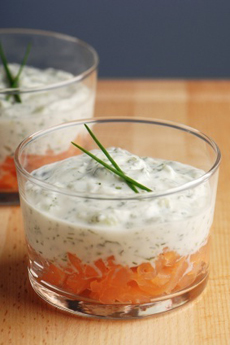February 19, 2012 at 7:20 am
· Filed under International Foods, Recipes, Spreads-Dips-Salsa, Tip Of The Day
|

Tzatziki tops minced smoked salmon for a
sophisticated appetizer. Photo by Grenouille
Films | IST.
|
|
Certain condiments are multitaskers, such that they can be used at different times of the day to make basic foods more interesting.
Salsa, from Mexico, is one example. Greek tzatziki (tsah-tsee-kee) is another.
A chilled mixture of yogurt, cucumber, garlic, lemon juice, olive oil, a pinch of salt and some fresh herbs (dill, mint or parsley), the cucumbers can be seeded and finely diced or puréed and strained.
Classic uses in Greek cuisine include as:
A spread or dip with pita (try toasting pita wedges)
An omelet filling or sauce
Part of a mezze plate (add hummus, babaganoush, olives and pepperoncini, feta cheese)
A sauce or side with meat, poultry and fish entrées (we particularly love it with salmon)
A condiment for gyros and souvlaki*
|
|
More ways to enjoy tzatziki:
As a healthy snack, with crudités or whole wheat pretzels
On a burger or sandwich, instead of conventional condiments
In a baked potato, with cooked vegetables and grains
As a garnish in cold soups
As a salad dressing (thin with some vinegar)
With salmon recipes (cucumbers and salmon are a natural pairing)
In a creative recipe of your choosing, such as the smoked salmon (or salmon tartare) in the photo above
Made with nonfat Greek yogurt, tzatziki is one of the healthiest sauces or condiments you can find, tasty and low in calories.
Try this tzatziki recipe.
People with lactose intolerance can use soy milk yogurt or try buffalo’s, goat’s or sheep’s milk yogurts, all of which are more easily digestible than cow’s milk yogurt.
More of our favorite dips and salsas.
*What’s the difference between a gyro and souvlaki? The preparation and shape. Souvlaki is cubes of meat (lamb, pork, chicken), cooked on individual skewers. The word means “small skewer” in Greek. The meat can be served on the skewer, on a bed of rice or in a piece of pita. Gyro means “going around.” A leg of lamb or other meat is cooked on a vertical rotisserie. The meat is sliced from the leg and served in pita. Döner kebap (“rotating meat” in Greek) and shawarma (“turning”) are other words from different regions, referring to the same food.
|
Please follow and like us:
Permalink
Comments are closed.



